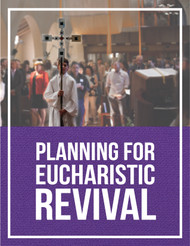Connect Mass to Mission • Succinct, powerful insights to read out during Mass
Great for regular Sunday Masses, RCIA/OCIA, Confirmation, and First Communion Preparation
Contact us for a full preview for evaluation.
After the blessing, the deacon or the priest dismisses the people with the words: “Ite, missa est.” These words help us to grasp the relationship between the Mass just celebrated and the mission of Christians in the world…. The People of God might be helped to understand more clearly this essential dimension of the Church's life, taking the dismissal as a starting-point.
—Pope Benedict XVI The Sacrament of Charity, 51
The Mass Is Never Ended will renew appreciation for the beauty and wisdom of the Mass for Catholics. Examining the Mass through the lens of the dismissal, Greg Pierce reveals how our Christian mission has not changed since Jesus gave it to the original disciples and that our daily work aims toward building the kingdom of God.
The word Mass comes from the Latin words for the Dismissal, “Ite, missa est,” which mean “Go, we are sent forth.” Sometime in church history, some people thought this was important enough to name the entire thing after it….
What is that mission? It is the very mission on which Jesus sent his disciples over 2,000 years ago. That mission is no less than to transform the world into a place much more like the way God would have things:
the world as it should be….The Mass is the perfect liturgy to help us accomplish this “mission impossible.” Looking through the lens of the Dismissal, Catholics would never go to Mass or come to Mass or attend Mass. We are coming back from having been sent forth from the previous Mass we attended….
One of the biggest challenges in adult formation is getting participants to show up. This teaching Mass script is short enough that you can use it in your regular Sunday liturgies and reach all of your regular attendees. It offers engaging insights that will provoke thought so your community will never experience liturgy the same again. The speaking points look at each part of the Mass through the lens of the dismissal, adapted from Greg Pierce's phenomenal book, The Mass Is Never Ended: Rediscovering Our Mission to Transform the World.
It utilizes the role of commentator, spelled out in the General Instruction on the Roman Missal, exactly as intended to provide the faithful “with brief explanations and commentaries with the purpose of introducing them to the celebration and preparing them to understand it better” [GIRM #105].
Includes:
- Script in PDF and editable Word format
- Suggested General Intercessions (Prayers of the Faithful)
- Suggested short homily
- Overview and guidelines, with tips on coordinating and implementing
As changes have been introduced to the Mass— from the major developments flowing from the Second Vatican Council to the most recent English translation of the Roman Missal instituted in 2011—much of the focus of formation has been on what is changing, and not as much on why we worship the way we do.
The Eucharistic Revival sponsored by the U.S. Bishops gives us a fresh opportunity to help Catholics better understand the Mass so they can participate more fully and better appreciate what we do when we gather to pray together in this way.
Liturgical guidelines provide an excellent mechanism—through the roles of the commentator and the presider—to offer this kind of formation on special occasions during the Mass itself. We recommend that parishes offer a series of teaching Masses to "break open" the liturgy, focusing on:
- The purpose behind parts of the Mass.
- The assembly's role during the liturgy.
- How the Mass prepares and orients us for our mission in the world.
- Historical context that puts the Mass in perspective.
Won't It Take Too Long?
One of the biggest concerns about offering teaching Masses is that they will extend the length of the service too much.
This partially comes from an expectation that parishioners' highest priority is to keep Mass as brief as possible. In our experience, Catholics are hungry to learn more about their faith and are happy to spend a little more time to do so, if that information is presented well.
With that said, there is no reason that a teaching Mass has to take significantly more time than a regular Mass. This may be an important if you have a tight Sunday Mass schedule.
Some strategies addressing the length question:
- Use scripts that are succinct.
- Work with your music ministers to open up more time for the commentator. For example, beginning or ending songs instrumentally can allow for extra speaking time. The number of sung verses could also be reduced.
- Omit the homily or drastically shorten it. (Note: Do not just announce that you will limit the homily, then proceed to give a substantial one. Prepare in advance what will be said at this time, as extemporaneous speaking can easily expand.)
- If necessary, split a script across multiple Masses. For example, you could offer commentary on the Introductory Rites the first week, Liturgy of the Word the next week, etc. Or you might do every other comment the first week and the others the second week.
- Announce teaching Masses well in advance to set expectations and allow parishioners to make alternate plans if they prefer.
Role of the Commentator
The General Instruction on the Roman Missal, initially written in anticipation of the major changes to the Mass after Vatican II, defines a ministerial role to provide formation during a Mass:
The commentator... provides the faithful, when appropriate, with brief explanations and commentaries with the purpose of introducing them to the celebration and preparing them to understand it better. The commentator's remarks must be meticulously prepared and clear though brief. [GIRM, #105]
In addition, the GIRM notes that the commentator should be clear about the text they will be using and that they should not improvise. "Harmonious planning and carrying out of the rites will great assist in disposing the faithful to participate in the Eucharist" [GIRM, #353].
Product Preview
Product License
This reproducible eResource is sold with a lifetime license for use within a parish, school, or diocesan office. You are allowed to make unlimited copies for use within your own community. You may also email these to members of your team or participants in your program. If you serve more than one parish or school, each should purchase its own license. You may not post our eResources to any web site without explicit permission to do so. Please contact us if you have any questions. Thank you for cooperating with our honor system regarding our product licenses.
| Format: | eResource |
|---|---|
| Product code: | PC501 |
| Dimensions: | 8½" x 11" |
| Length: | 12 pages |
Author
Paul Canavese serves as director of The Pastoral Center (PastoralCenter.com), author, frequent conference speaker, and pastoral consultant. He has his MTS from the Franciscan School of Theology in Berkeley. He directs GrowingUpCatholic.com (focused on coaching parents) and GospelLiving.org ("intentional daily life Catholicism"). He has served in a wide range of parish ministries, most recently as a pastoral consultant at Corpus Christi Parish in Piedmont, CA. Paul also has 20 years of experience in software development and management with technology startups and social media. Along with his wife Ann, two daughters, and seven chickens, he lives in Alameda, CA, where they operate a mini-urban farm and looks for creative ways to build community in their neighborhood.









